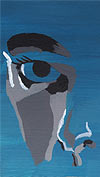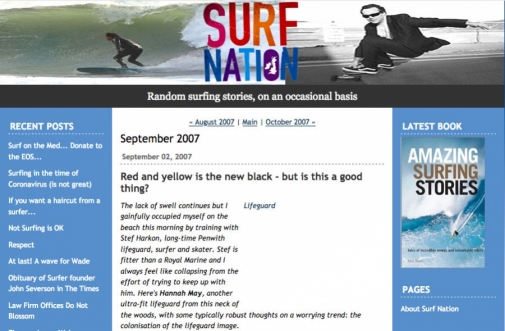

Red And Yellow Is The New Black - But Is This A Good Thing?
If I walked into a hospital wearing a pair of scrubs or white coat, there could be trouble. Simple truth is: Iím not a doctor. So why this current craze (dare I say, trend?) of people wearing Lifeguard T-shirts and hoodies?
Donning the red and yellow attire that is our distinctive appareil may well smack of fashionable flattery, but to us, itís fast becoming a potentially fatal move. Itís a similar trend to the way in which surf wear now has mass-market appeal - such is modern dayís commodification of lifestyle and culture. Having instantly recognisable surf-associated brands emblazoned across the body has rapidly become a mechanism to identify not only with a sport, but an entire, ocean living ethos.
But whether as a socio cultural statement or for pure comfort, people opting for the ĎLifeguard Lookí may want to reconsider. For us, itís not a niche clothing label, but a vital means of identification in the crowds, especially in an emergency. Yes, clothing is a necessity (and some people at my local nudist haunt Pednevounder may wish to consider this point in more depthÖ), but there is choice involved. And irrevocable repercussions.
This isnít a minor, superficial point. Thereís a real potential for tragedy, as impersonation should not have to become improvisation when in the blind panic of urgency, a random member of public sporting lifeguard red and yellow is approached by someone in desperate need of help. The danger of mistaken identity segueways into an oft-debated beach issue Ė the limits of responsibility.
Many beach goers assume that they have little or no individual responsibility. To keep the beach clean, respect the warning flags, look after their offspring Ė these are things for Other People, not them. At the same time, they believe they have the power to do, or not do, whatever they like. This rather paradoxical stance both riles and baffles me. People are adamant that they can do whatever they please whilst in the public vicinity of the beach, but totally fail to recognise the effect of their behaviour on others. I could narrate a bevy of anecdotes to support this, but I wonít. Suffice to say that often enough the culpable are tourists Ė but theirs are innocent mistakes, and they usually respond in kind to our explanations. Other times itís people who donít care and donít respond. The worst, and all-too-frequently observed type, is the local know-it-all. Only hitch is that what they know is usually as much use as a surfboard in a sauna.
The river where I work is a good example of this syndrome. Itís red flagged for a reason, but try telling that to Johnny Local. Itís essentially a massive rip tide that has repeatedly dragged people to their death, but Johnny Local and his pals will argue the point until, well, one of them has to be rescued. By me and my colleagues. Not that we mind Ė itís what weíre there to do Ė but what gets me is the sheer arrogance, ignorance and selfishness demonstrated by Johnny and his mates. Donít they realise that theyíre setting an example? That when they step into the rip, another, weaker, more vulnerable beach-goer might follow? If I have to hear one more speech about how ĎIíve lived here for years Ė who are you to tell me what to do?í I might justÖ well, Iíd better not say.
But hereís the thing. Iím not legally obliged to come and rescue you from a red flagged area. My obligations diminish yet further if youíve just told me to sling it. Yes, I know Ė I would come and rescue you. But remember: in the wake of you breaking a bye-law, you could end up with a fine to take back home.
Bottom line is: I donít waltz into your place of work and argue with you and try to tell you how to do your job, so donít refute me and tell me how to do mine. Why take the risk when Iíve informed you of the likely consequences? Itís disrespectful to you, as well as to me. Imagine walking into a police station (whether uniformed or not), and proceeding to usurp their position. You just wouldnít.
So with all of this current mimicry malarkey on our coasts. It requires redress in the form of legislation or, at least, an enforceable warning system to stop people wearing such items on or near the beach. Let us do our job. And let people recognise that. Take your head out of the sand, out of your faux lifeguard T-shirt and out of your imitation lifeguard shorts, and step into the reality of collective power and responsibility. The clothing there is a lot better.